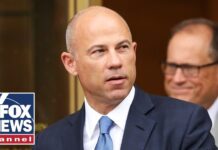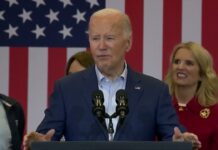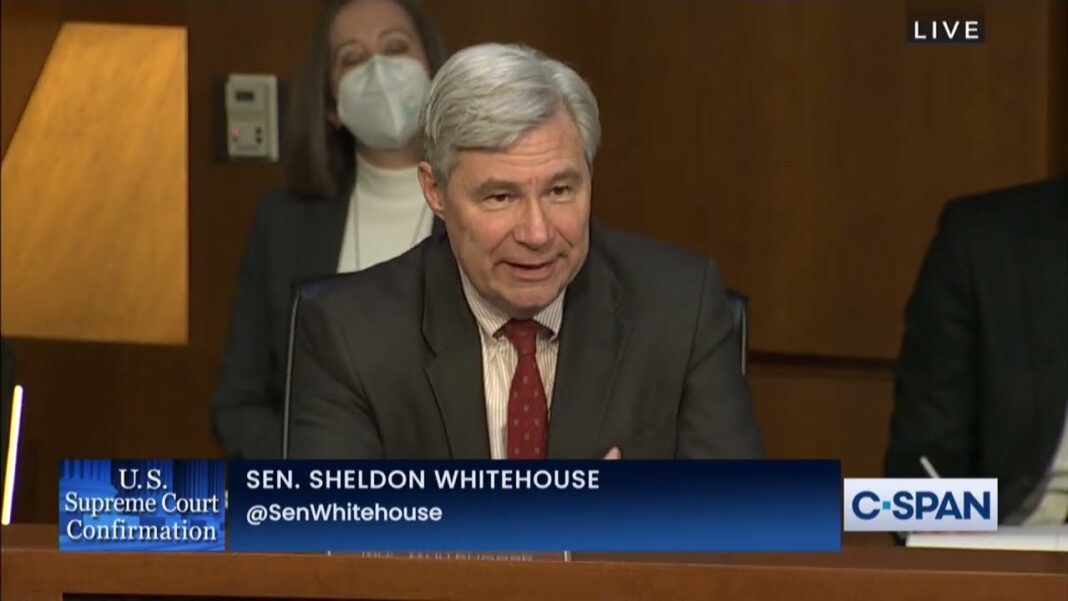The Supreme Court nominee’s hearings expose the hypocrisy of Sen. Sheldon Whitehouse’s crusade against it.
In the background of this week’s nomination hearings for Supreme Court nominee Ketanji Brown Jackson, one could hear a welcome noise: Sen. Sheldon Whitehouse’s glass house shattering.
The Rhode Island Democrat has spent a decade hucking boulders at his favorite bogeyman, “dark money.” When not threatening judges, Mr. Whitehouse papers the Capitol with reports that claim to expose the shady links between covert right-wing “front groups” funded with dirty “multimillion-dollar checks” and secretly giving orders to conservative Supreme Court justices. Mr. Whitehouse hasn’t yet accused the Federalist Society of inventing dark money in a Wuhan lab—but give him time.
With great glee, Republicans spent the week highlighting the extent to which Justice Jackson’s nomination was being pushed by covert left front groups funded by much larger checks to sway the Supreme Court. The reason Mr. Whitehouse is such an expert on “dark money” is because his site has been using it longer and making it so much bigger and better. With the Jackson nomination uncovering that truth, perhaps Washington can finally have a more honest debate about what’s really at stake: free speech.
The term “dark money” only emerged 12 years ago when the left-leaning Sunlight Foundation used it in the wake of the Supreme Court ruling Citizens United vs. Federal Electoral Commission. Both sides had long-standing nonprofit organizations, and both had long understood the importance of granting First Amendment protections to donors. But the left resented it citizens united opened the way for a growing conservative non-profit movement to compete more directly in the political arena. President Obama launched a campaign against “shadowy” right-wing groups and donors that inspired the Internal Revenue Service’s scandalous targeting and intimidation of conservative nonprofits.
The insults to conservatives distracted from the left’s own “dark money” operation – which eclipses everything right-wing on the right, including the Supreme Court fights. The left pioneered this activism in 1987, when a “dark money” group called People for the American Way spent $1.5 million in attack advertising against Robert Bork.
The left’s new high-court powerhouse is Demand Justice, whose influence on the Jackson nomination is far from secret. Demand Justice has led campaigns against Donald Trump’s nominee for justice, including vicious attacks on Justice Brett Kavanaugh. It issued “grades” for Senate Democrats, assessed their efforts to halt Trump’s appointments, and is a leading proponent of court hearings. It prompted the pressure campaign for Justice Stephen Breyer to retire, even hiring a promotional truck reading “Breyer retire” to tour the Supreme Court.
Demand Justice submitted a “shortlist” of acceptable liberal decisions to the Supreme Court in 2019 and this month invested $1 million in an ad campaign for Justice Jackson. Not that Demand Justice needed publicity to make an impact. White House Press Secretary Jen Psaki is a former communications adviser for the group. Lead White House Counsel Paige Herwig, charged with shepherding the Biden selection, was an assistant attorney at Demand Justice. And the group’s executive director, Brian Fallon, is a former communications director for Senate Majority Leader Chuck Schumer.
Demand Justice was a project of the Sixteen Thirty Fund, which Atlantic describes as the “undeniable heavyweight of Democratic black money.” Mr. Whitehouse loves to accuse the Federalist Society of raising $400 million in “dark” donations over four years. The Sixteen Thirty Fund distributed $410 million in “dark” funding in 2020 alone.
The fund itself was seeded by a number of black money outfits; works with a non-profit dark money sister company (New Venture Fund) that awards grants to left-wing dark money causes; and is managed by Arabella Advisers, which oversees a network of liberal dark-money nonprofits. It would take Mr. Whitehouse the rest of his life to unravel this web if he really cared about exposing dark money.
He doesn’t, as was amusingly revealed this week. The senator furiously tried and failed to bring attention back to the “right” dollar, and at one point veered into a defense of liberal black money. The Jackson hearings made it clear that Mr. Whitehouse and his media partisans only want to win. Their aim is to muzzle the right by using “disclosure” to unleash liberal mobs who intimidate conservative donors into submission. Barring new disclosure rules (which liberal nonprofits oppose), he will use the dark money issue to paint opponents as sneaky and corrupt. It’s getting harder now, even though the media spent a week portraying GOP senators as hypocrites.
Republicans would have been wiser this week if they had done more than point out the reality of “dark money.” This was an opportunity to speak out for freedom of expression. Both sides practiced it during the Trump nominations; Both sides are doing it now. It can be ugly, but it’s fundamental to American political debate, and neither side has a monopoly. Or at least not as long as Mr. Whitehouse fails to sell his partisan “dark money” agenda.
Read Original Article on WSJ.com














































